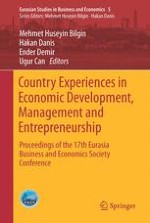2017 | OriginalPaper | Buchkapitel
Institutions and Economic Growth in the Resources Intensive Use Economies
verfasst von : Taisya Pogodaeva, Nadezhda Senchenko
Erschienen in: Country Experiences in Economic Development, Management and Entrepreneurship
Aktivieren Sie unsere intelligente Suche, um passende Fachinhalte oder Patente zu finden.
Wählen Sie Textabschnitte aus um mit Künstlicher Intelligenz passenden Patente zu finden. powered by
Markieren Sie Textabschnitte, um KI-gestützt weitere passende Inhalte zu finden. powered by
